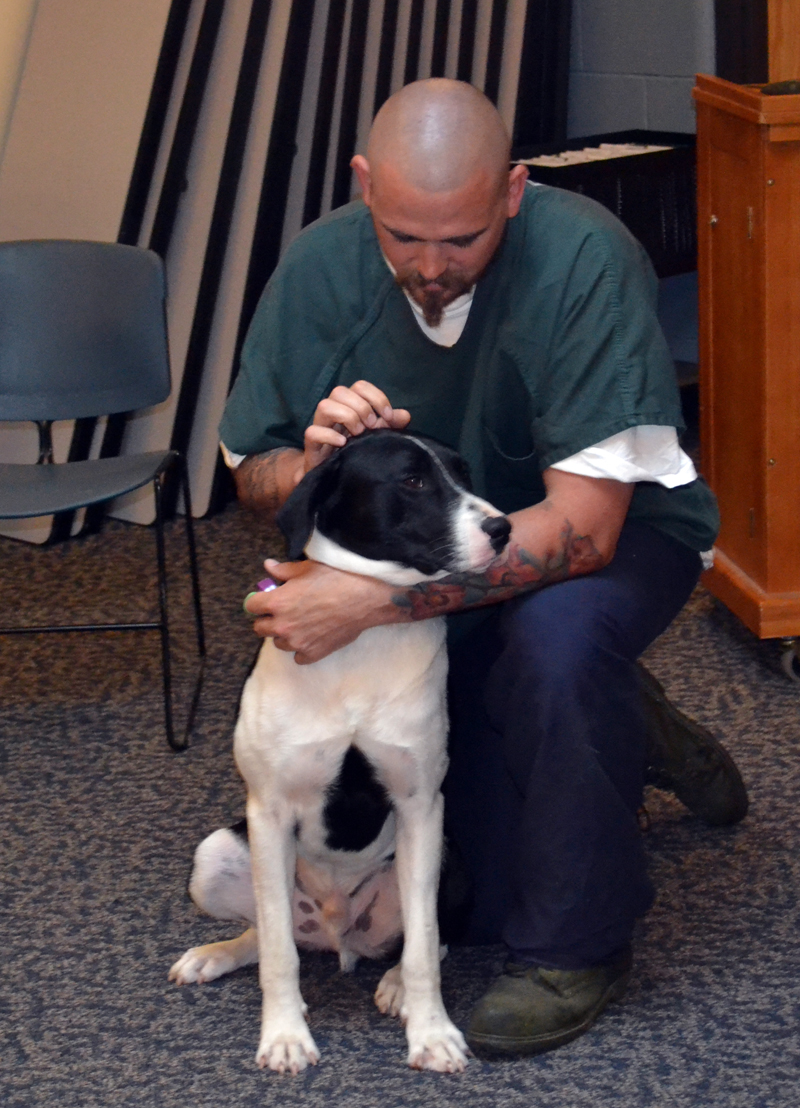
From left: Dustin Campbell, Coastal Humane Society trainer Mike Gould, and Norman Palmer present rescue dogs Jake (left) and Melvin with certificates of completion upon their graduation from Two Bridges Regional Jail’s new dog obedience program Tuesday, May 23. (Abigail Adams photo)
Two rescue dogs will be more likely to find new homes after their graduation from Beyond the Bars, a new dog obedience program at Two Bridges Regional Jail.
Coastal Humane Society trainer Mike Gould and Two Bridges inmates Norman Palmer and Dustin Campbell presented rescue dogs Jake and Melvin with certificates of completion during a ceremony at the jail Tuesday, May 23.
The canines were the first to graduate from the program, which has been in the works for several years, and which the jail hopes to expand, said Capt. James Bailey, the jail’s acting administrator.
For the past two months, Jake and Melvin have lived at Two Bridges in a minimum security housing unit, or pod, for men, as Palmer and Campbell taught them basic commands, such as sit, down, stay, and shake.
Jake, a 2-year-old border collie mix, and Melvin, a 4- or 5-year-old terrier-pit bull mix, were transported to the Coastal Humane Society from a high-kill shelter in the south, Gould said.
The dogs had no bite history and interacted well with other animals, but lacked “certain manners,” Coastal Humane Society Executive Director Joe Montisano said. They would pull on the leash and Jake, in particular, had trouble focusing.
Both are larger dogs, and their lack of basic obedience training hindered their adoption prospects, Montisano said.
The idea of a dog obedience program at Two Bridges Regional Jail dates back almost five years, when the idea was first proposed and researched, Bailey said. Several correctional facilities have partnered with animal rescue groups to develop such programs.

Melvin follows Norman Palmer after demonstrating some of the commands Palmer taught him as part of Two Bridges Regional Jail’s new dog obedience program. (Abigail Adams photo)
The idea was pushed to the back burner, but was brought up again a few months ago.
Two Bridges called the Coastal Humane Society to ask about a potential program and Beyond the Bars was born. Gould was tasked with “training the trainers” and developing the training program used at the jail, Montisano said.
Gould worked with Two Bridges Regional Jail Sgt. Kyle Canada to develop the program, which “is all about positive reinforcement,” Gould said.
Inmates are primarily responsible for the care of the animals throughout the eight- to 12-week program, with Gould visiting Two Bridges Regional Jail weekly to give instructions on training the animals, according to a press release from Coastal Humane Society.
In the process of feeding, cleaning, walking, and training the rescue dogs, inmates form a bond with them.
Palmer and Campbell served as “handlers” for Jake and Melvin, teaching them basic commands and social skills.
Over the course of the program, it has been amazing to see the dog’s growth, Palmer said. Palmer primarily worked with Melvin, whom he considered adopting after the end of his sentence.
A pit bull mix, Melvin is a little bit of an “ugly duckling” and people may not want to adopt him because of misunderstandings about the breed, Palmer said. When Melvin arrived at the jail, he was shy and nervous around people, which may be a sign of past abuse.
Now, Melvin can’t get enough attention, Palmer said. Throughout the course of the program, Melvin was cared for by the 20 men in the pod and the staff at Two Bridges, Palmer said. The positive attention changed Melvin’s behavior.
The socialization has been great not only for the dogs, but also for inmates and staff, Bailey said. Inmates in the pod behave differently due to the program, he said. The pod is calmer than others, and inmates follow the rules because they don’t want the program to go away.
There were some reservations about noise and distractions when the program began, but the training program and everyone involved has been great, Canada said.

Two Bridges Regional Jail inmate Dustin Campbell says goodbye to Jake, who graduated from the jail’s new Beyond the Bars dog obedience training program Tuesday, May 23. (Abigail Adams photo)
There were no issues with barking at night, Canada said.
And there was only a very rare “accident,” Montisano said.
When Campbell transferred to the minimum security pod, he was asked which job he preferred – working in the kitchen or working in the dog obedience program. He chose to work with the dogs.
The work was “good but sometimes challenging,” Campbell said. The dogs “can be pig-headed.” Campbell worked primarily with Jake. Jake had a lot of anxiety issues when the program began, but he has been able to work through them, Campbell said.
The hardest part of the program now is seeing the dogs leave, and worrying about whether they will be able to find good homes, Campbell said.
Thanks to the program, Jake and Melvin will be more likely to find their forever homes, Montisano said.
Larger dogs with no obedience training tend to be the ones shelters struggle to find a home for. The program has made Jake and Melvin “more adoptable,” he said, and will do the same for future graduates.
Upon graduation, Jake and Melvin will return to Coastal Humane Society shelters in Edgecomb and Brunswick where they will be eligible for adoption.
The jail hopes to expand the dog obedience program to include up to six dogs in a class and female inmates as well, Bailey said.
The progress of the dogs in the class will be posted on Two Bridges Regional Jail’s website at tbrj.org and people can adopt the dogs while they are in the process of completing the program, Bailey said.
The training program is beneficial for all involved, Montisano said.
Jail officials agreed. “It’s great for the inmates, for staff, for the dogs, and for the Coastal Humane Society,” Bailey said.






